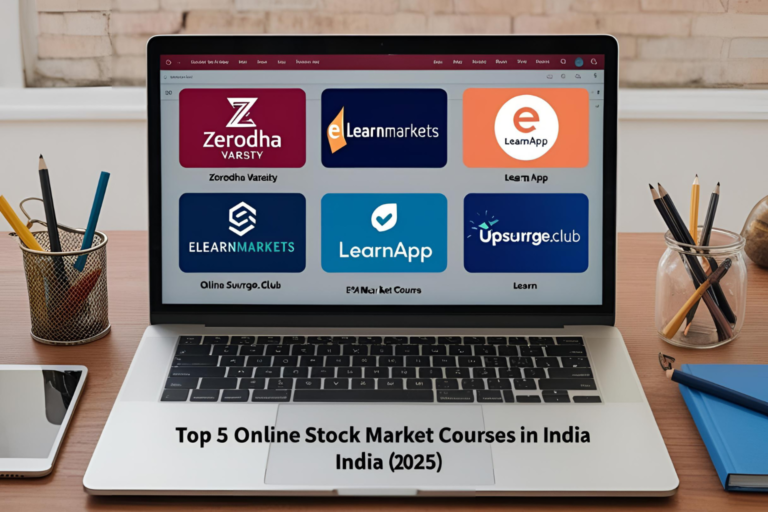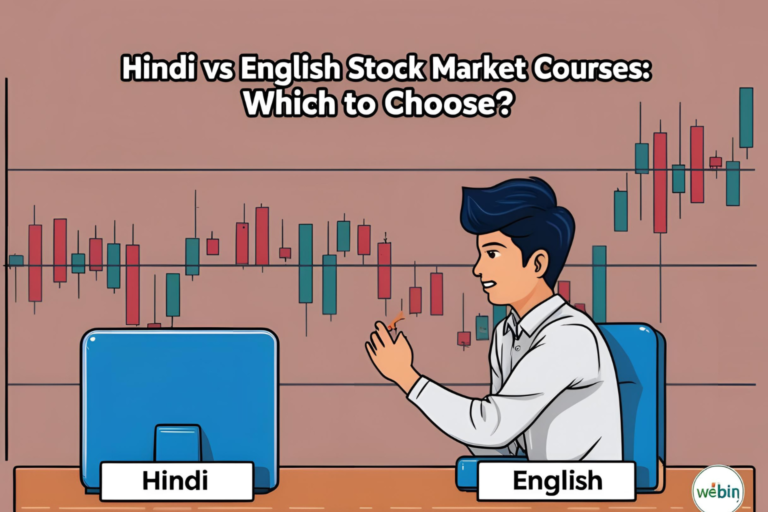Free vs Paid Stock Market Courses in India
If you’ve just started exploring stock market education in India, one common dilemma is this:
“Should I go for a free course or invest in a paid one?”
The internet is full of both — free YouTube tutorials, open-source blogs, structured paid programs, and certification-backed modules. But what truly adds value?
This blog compares free vs paid stock market courses in India, covering their pros, cons, ideal audience, and what you can expect from each.
What Free Courses Offer
There are many high-quality free resources available for Indian learners, such as:
- Zerodha Varsity
- YouTube channels (Pranjal Kamra, CA Rachana, FinnovationZ)
- Free courses from Elearnmarkets
- Blog-based education platforms
✅ Pros of Free Courses:
- No Cost
Perfect for beginners who are exploring the basics without financial commitment. - Flexible and Accessible
Learn at your own pace without deadlines or schedules. - Wide Availability
Hundreds of free courses, playlists, and blogs exist for almost every trading concept.
❌ Cons of Free Courses:
- Lack of Structure
Most free content isn’t organized into a proper syllabus. It may feel scattered or repetitive. - No Personal Guidance
You’ll need to self-navigate through questions, doubts, or trading mistakes. - No Certification or Recognition
Free courses don’t offer certificates, which are important if you’re building a career in finance.
What Paid Courses Offer
Paid courses are available through platforms like:
- Elearnmarkets
- LearnApp
- NSE Academy
- BSE Institute
- Upsurge.club
- Trading Campus
✅ Pros of Paid Courses:
- Structured Learning Path
Paid courses usually offer a complete roadmap with beginner to advanced modules. - Live Sessions & Mentorship
Many include webinars, Q&A sessions, and access to experts or mentors. - Certifications & Industry Tie-ups
Useful for those looking to enter a finance career or gain credibility. - Quizzes, Projects, and Simulations
Paid platforms often include practice tests, live trading examples, or mock trading tools.
❌ Cons of Paid Courses:
- Cost Can Be High
Prices range from ₹999 to ₹25,000 depending on duration and provider. - Variable Quality
Not all paid courses are good. Some may only repackage free content.
Side-by-Side Comparison
| Feature | Free Courses | Paid Courses |
|---|---|---|
| Cost | ₹0 | ₹999 – ₹25,000+ |
| Content Quality | Basic to Good | Good to Excellent (varies) |
| Certification | ❌ No | ✅ Yes |
| Structured Curriculum | ❌ No | ✅ Yes |
| Instructor Access | ❌ Rare | ✅ Common |
| Practice Tools | ❌ Limited | ✅ Often Included |
| Ideal For | Casual learners, complete beginners | Serious learners, career aspirants |
When Should You Choose a Free Course?
- You’re just getting started and want to test the waters.
- You prefer learning casually at your own pace.
- You’re on a tight budget.
- You only want to manage personal investments and not pursue a trading career.
Best Free Course Picks:
- Zerodha Varsity: Best free structured content
- Pranjal Kamra’s YouTube: Easy to understand for beginners
- Elearnmarkets Free Webinars: Quick-topic learning
When Should You Go for a Paid Course?
- You want step-by-step guidance from experts.
- You’re planning a career in finance or want SEBI/NISM certification.
- You’ve tried free resources but feel stuck or want deeper understanding.
- You need advanced tools, trading simulations, or mentoring.
Best Paid Course Platforms:
- LearnApp: For video-based expert courses
- Elearnmarkets (Paid Modules): For NSE/BSE tie-ups and live market practice
- Upsurge.club: For niche trading strategy-focused content
Final Verdict
Both free and paid stock market courses have value — it all depends on your goals.
Start free. Then pay when you want depth, mentorship, or certification.
If you’re investing for personal growth, free courses are enough to get started. But if you’re preparing for a job in trading, advisory, or finance, investing in a structured paid course is well worth the money.
FAQs
Q1: Can I learn stock trading completely free in India?
Yes, platforms like Zerodha Varsity and YouTube offer excellent free content. But you may miss out on structured learning and advanced concepts.
Q2: Are paid stock market courses worth it in India?
Yes, especially if you’re serious about building a finance career or need personalized guidance and certifications.
Q3: Which free course is best for beginners?
Zerodha Varsity is widely considered the most organized and beginner-friendly free platform in India.
Q4: How much should I spend on a stock market course?
Beginners should start with lower-cost paid courses (₹999–₹3,000). Advanced learners or job-seekers can invest more.
Q5: Do paid courses guarantee trading success?
No course can guarantee success. A course can give you tools and understanding — consistent practice and discipline make the difference.


